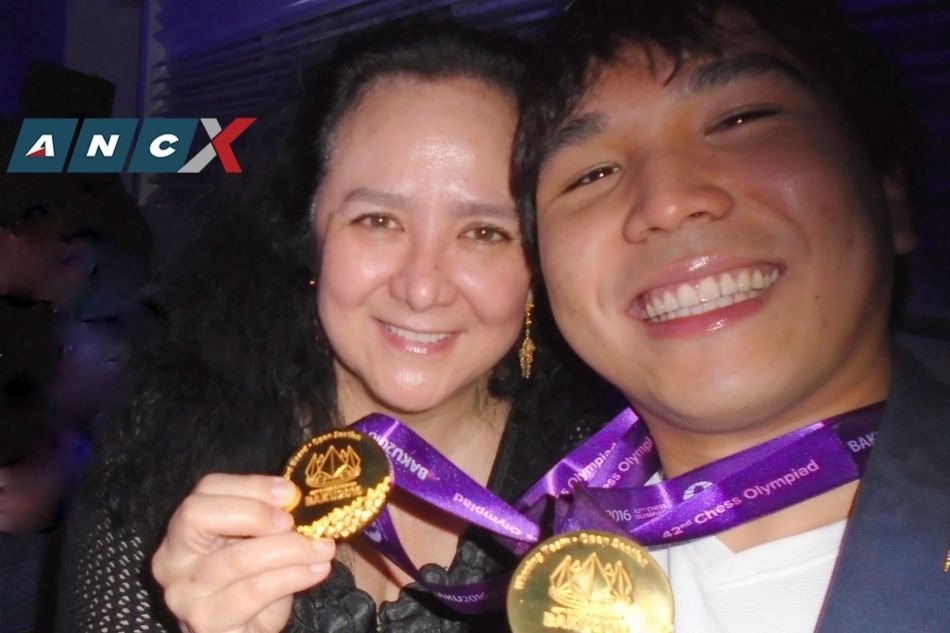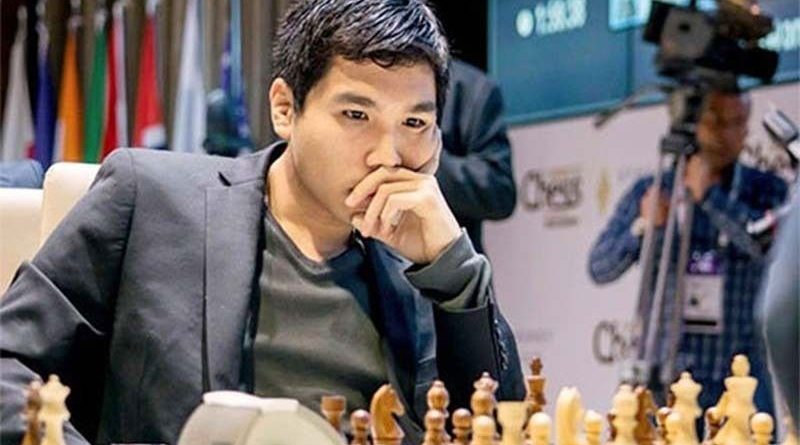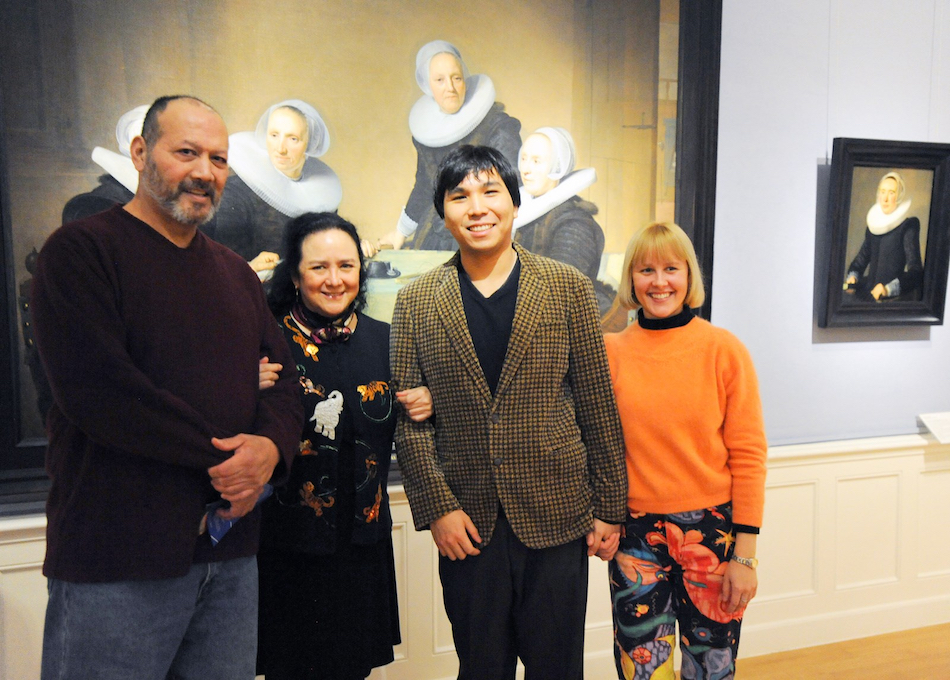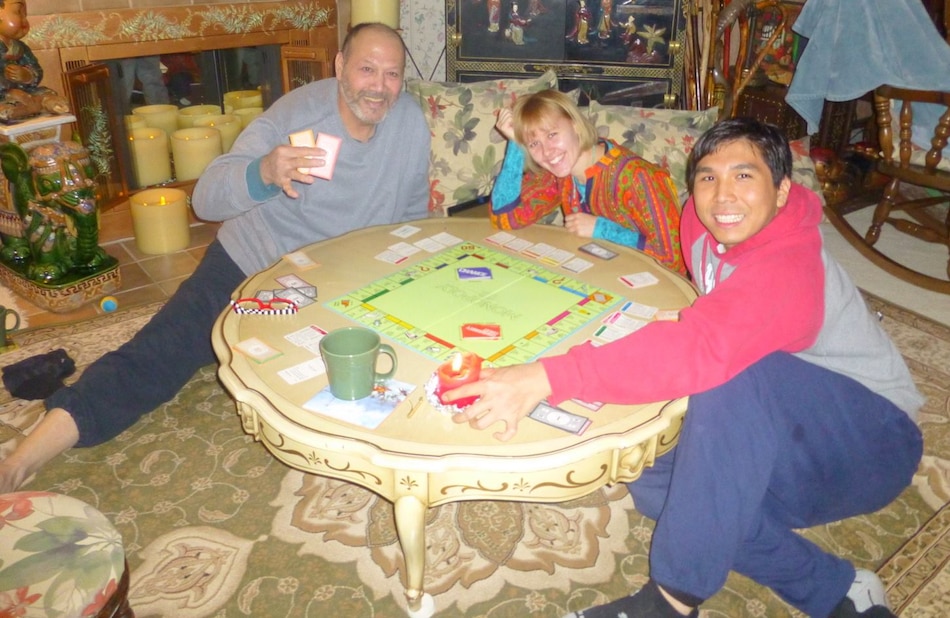CHESS: MINNESOTA USA- Exclusive: Wesley So in the eyes of Lotis Key
 Wesley represented the US at the 42nd Chess Olympiad, winning team and individual gold.
Wesley represented the US at the 42nd Chess Olympiad, winning team and individual gold.

People within the international chess circles know that if you want to get to Grandmaster Wesley So, you first have to go through Lotis Key.
The Filipino-American, who took Wesley under her wing beginning when the boy was age 19, has been assuming the role of a momager (a mom and manager) to the chess champ for about eight years now. “I handle all the logistics of holding an elite player’s life together,” she tells ANCX. “You would not believe how much effort that takes. It’s an ever increasing multitude of little things piled one on top of another, needed to keep an elite athlete in business.”
Lotis travels with Wesley everywhere. And to hear her say it, the nitty-gritty can indeed amount to a lot. She enumerates them—“planes, cars, venue locations, time schedules, food, clothing, hotels, inoculations, visas, passports, insurance, interviews, etc. etc. etc.”
Even Lotis’ husband, former basketball star Renato “Bambi” Kabigting, and her daughter Abbey, contribute their share in creating an ideal, stress-free environment for this working sportsman on top of his career. “He needs to focus 100% on playing chess while we focus on the business of taking care of him. The career of any elite athlete is incredibly complex,” shares Lotis.
Who is Lotis Key?
The lady is not exactly a stranger to the life of a celebrity. Back in the ‘70s, she was one herself. Lotis Key was a popular name in the Philippine showbiz firmament, starring in quite a few movies like “Stardoom,” “Darna Kuno,” “Captain Barbell,” “Kung Fu Master” and “Facundo Alitaftaf.” Many of her projects were opposite Comedy King Dolphy with whom she became romantically involved.
Lotis left Manila in the ‘80s with her cager husband, eager to start anew and explore what life had to offer, minus the “societal pressure,” she shared in an interview with PEP in 2012.
The couple settled down in Minnesota, and Lotis did what she set out to do. According to the website lotiskey.com, she established a career as a film actress in the US and dabbled in theater. She became a voice and on-cam talent for shows and commercials. She wore the hat of a producer and an artistic director for a Christian theater group she founded called Messengers, and toured her productions across the United States, Canada, and Asia.
Outside the entertainment world, Lotis published her own novels, worked in an orphanage, even ran a restaurant. She was also behind a ministry that sends homeless children to school. Her profile on Positively Filipino indicates that she’s also raised horses in the Australian outback, skied the Alps, ran tours around a tropical jungle, bought and sold antiquities, and bred show animals.
Meeting Wesley
Lotis and her family met Wesley in the US in 2013. It was a private dinner hosted by a common friend. “I saw that he was quite lonely and lost,” she says of seeing the boy from the Philippines for the first time. But for some reason, she was drawn to this teenager, “who fits in very, very well with the family,” Lotis told StarTribune in an interview. They developed close relations and Wesley spent Christmas with them that year.
At that time, Wesley was starting to make a name for himself as a chess scholar at Webster University in St. Louis, Missouri. He had been living on his own since age 16 when his biological family migrated to Canada. The boy opted to stay behind in the Philippines then to pursue chess. As fate would have it, an opportunity to become a chess scholar in the US fell on his lap in 2012.
Lotis knew practically nothing about the sport when she met Wesley. But she became instrumental in the realization of the young man’s dreams to become a top chess player. “It is almost impossible to explain,” Lotis says when asked how it all happened. “But I instinctively knew something about him.” Wesley told her he wanted to play chess full time but was filled will self-doubt as to how he was going to do it.
A self-confessed adventurer, as she admitted in the PEP interview, and a believer in following one’s heart, as can be gleaned from all of her professional and personal pursuits, Lotis advised Wesley to “quit everything else and try chess seriously for two years.” It wasn’t the meaningless, throwaway advice that people tell strangers they meet at parties. Lotis actually offered Wesley a home he can crash in while he fixed all the paperwork he needed, he once told chess.com.
Lotis told Wesley he had to focus on chess completely, allowing no doubts or distractions to enter his mind. If it happens that he fails, he could always go back to school. Her instinct was proven right when on the first year alone, the young man started enjoying incredible success.
Wesley’s website cites some of his major wins in 2015—placing first at the Bilbao Chess Masters in Spain, winning the 22nd Bunratty Chess Festival in Ireland, and also the Czech Chess Trophy in a 4 Game Match with Czech GM David Navara.
The following year, Wesley brought pride to the American flag—he had already made the switch to the US Chess Federation that year—when he won its first gold medal since 1976 at the 42nd Olympiad in Baku Azerbaijan.
How to mother a chess genius
Lotis had since “adopted” Wesley—“not legally,” Lotis clarifies, because “he was already too old (19) when we met him.” Over the years, she and her husband simply embraced the roles of his real parents sans the paperwork.
Being a parent to the chess superstar means allowing him his personal space when he wants to be alone. “He does not like to interact with people outside the family [during a tournament],” Lotis offers. “It is dangerous in a highly competitive arena to expose yourself to outsiders on the day of a match.”
Wesley was forfeited from a round nine game against Varuzhan Akobian in the U.S. Chess Championship in 2015, for a rules violation. He later admitted to StarTribune he was trying to fix family problems during the course of the tournament, which diverted his energy from the board to the family drama at hand. Wesley reportedly had confrontations with his biological mother, Eleanor So, who wanted him to go back to college or lose complete contact with his family, including his sisters. (On the issue of his game being forfeited, Lotis sets the record straight: Wesley was not taking notes during the Akobian game. “He had written a calming mantra to himself not to rush his moves. It said, “think once, think twice think three times”. It was on a paper on the table and everyone could see it.”)
“What is Wesley like at home?” we ask Lotis.
“He has intense focus and can study for hours with no prompting at all,” the adoptive mother replies. “He is highly disciplined. In fact, I try and curtail his studying and make him rest his mind.”
A chess player’s need for tranquility is most likely one of the reasons Wesley was easily drawn to the city of Minnetonka. “It is wonderful and quiet [in our place]. We all work, eat together and take walks. It’s a very, very simple life. We are not party people and have no need to go out and find attention. We all enjoy staying at home with our pets. I love the outdoors, and during this quarantine, [I have] focused on building my gardens,” shares Lotis.
Rules of the game
As parent and child, the two get along almost always. They do have disagreements, which mostly stem from their own cultural affinities. “I am more American. I am naturally fearless and confident,” says Lotis. “I always try to be the best. [Wesley] is more Filipino. And Filipino culture focuses on pakikisama, barkada, kabaitan—never trying too hard to be the best because baka sabihin, ‘akala mo kung sino ka.’ You know what I mean.”
The woman, of course, knows whereof she speaks, having worked both in the Philippines and in the US. Pakikisama and all that “may work well in the barrio, but on a world stage with Russians, Chinese, and Indians, you will be eaten alive if you don’t toughen up and push back,” she would tell Wesley.
“Growing up in the Philippines, there is a very deep crab mentality that holds people back,” Lotis adds, “like no one should ever be better than his friends. No one should aim high. They should stay on the same level all their lives. Exact opposite of mentality in the States.”
A perfect world
Lotis swears she likes staying at home. Yet she has traveled for most of her life—first, with her jetsetter parents as a child, and then with her husband who took a job in an airline. “Then Wesley came into our lives. And believe me, the travel for a chess career just never stops.”
Being a parent and manager means being with his son in all of his travels. “He does not like to be everywhere, alone,” the lady shares in a poignant essay she wrote for Positively Filipino. “People ask me how [Wesley] copes with so much travel,” she shares. “The truth is, as long as someone else does the packing and handles every single bit of the complex logistics, he doesn’t care if we arrive, return, or even depart.”
But make no mistake—the man is really not at all a kind of high maintenance sports star. He has the most practical needs and simple whims. As Lotis writes in her essay, all this grandmaster wants, when they’re in some waiting area somewhere in the world, is a good spot to lie down on, snacks (he’d be extra happy to have some Turkish delight), and his chess board. “Once ensconced, feet on the armrest at one end, head on my coat at the other, his world disappears,” says Lotis. “On his stomach balances a chess board with armies arranged in what appears from his glazed eyes, to be satisfying patterns. His life is perfect.”

All images from Wesley So’s Facebook page, published here with permission.















